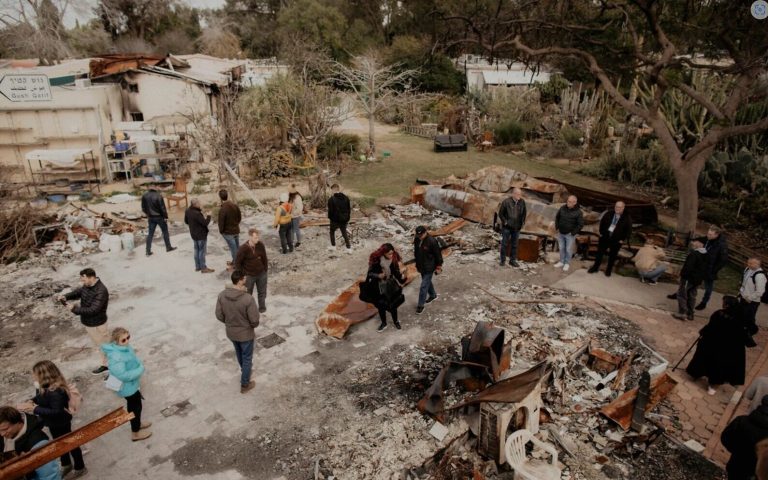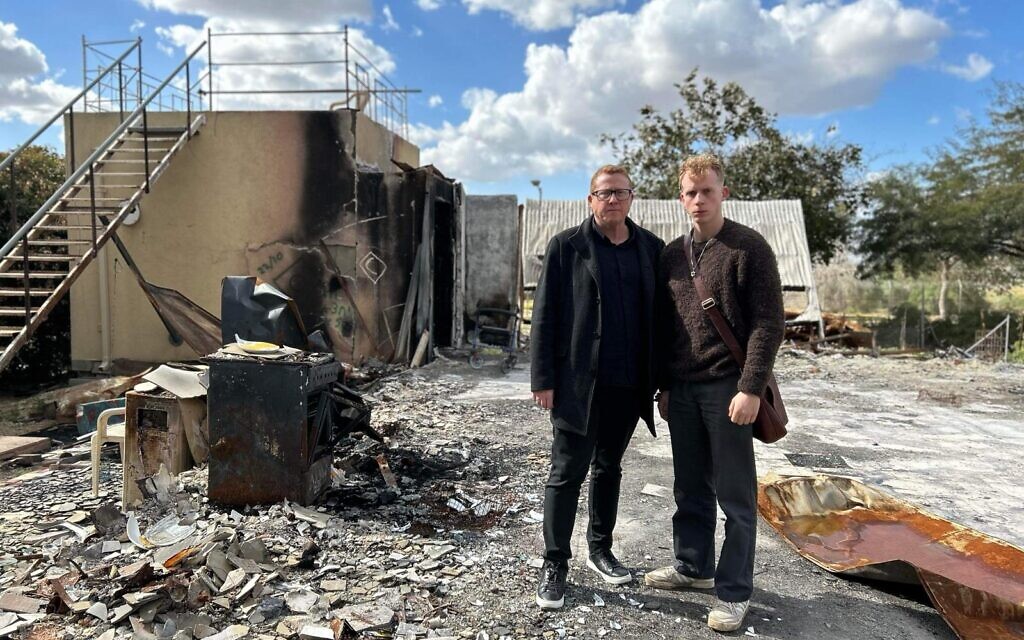While waiting for the rocket warning siren in the air raid shelter at Ben Gurion Airport, Jani Salokangas wished he could stay in Israel and not return to join his wife and five children in Finland.
“I felt sad that I had to leave. I wanted to stay and do something,” said Salokangas, a 40-year-old pro-Israel Christian community leader, who was in Israel on Oct. 7 to lead an 80-person delegation from his church.
Four months after the start of the war sparked by Hamas’ attack on Israel on October 7, Salokangas returned to Israel last month with a new Finnish delegation, which he took through southern Israel as part of of a solidarity trip featuring volunteering, bearing witness to the crimes of Hamas and praying hard for Israel’s success.
His delegation was among dozens of Christian groups returning to Israel on solidarity trips – sometimes under fire – to the epicenters of the tragedy. Feeling inextricably linked to Israel and Judaism, visitors see the war as the dawn of a new, closer Jewish-Christian alliance, which had been strained last year by the actions of Jewish fanatics in Jerusalem.
These actions – including the harassment of priests and pilgrims in the old city and a noisy protest rally on May 28 near the Western Wall against a Christian prayer service – were “concerning,” according to David Parsons, vice president of the International Christian Embassy in Jerusalem. But “after October 7, it was quickly forgotten by most pro-Israel Christians,” added Parsons, whose prominent pro-Israel Christian group was established in 1980.
In a Hebrew language of June Maariv In an article, the president of the International Christian Embassy in Jerusalem, Dr. Juergen Buehler, described the events of May 28 as unprecedented. “It was one of the rare times in Israel when I was afraid of an attack. I had never experienced such hostility before,” said Buehler, a German-born ordained minister and physicist who has lived in Israel since 1994 and whose two sons serve in the Israeli army’s combat units.
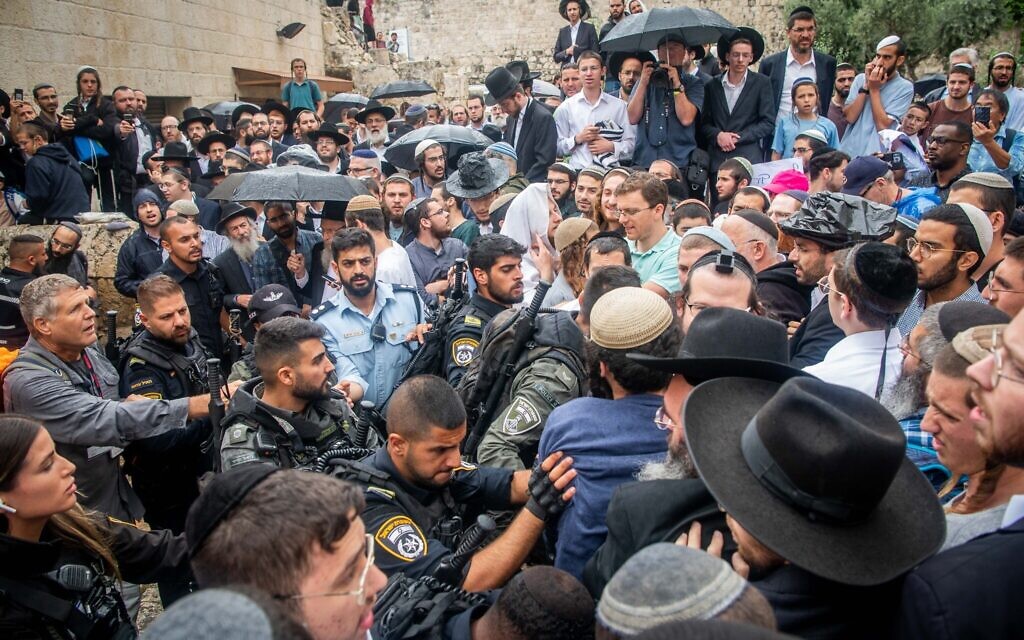
Jewish activists confront police during a protest against a Christian conference outside the Davidson Center in Jerusalem, Israel, May 28, 2023. (Arie Leib Abrams/ Flash90)
The May vitriol “was aimed at people who spent a lot of money on a trip to Israel and it was a very bad experience for them in the Holy Land. I find this extremely regrettable,” Buehler told Maariv.
The demonstration included several hundred demonstrators and was led by Jerusalem Deputy Mayor Aryeh King. Protesters, some of whom clashed with police, shouted at Christians gathered near the Western Wall to “go back” and “stop proselytizing.”
This demonstration followed a series of incidents involving clergy in Jerusalem. Dozens of cases of Orthodox Jews have been documented spit on the field in front of clergy and other Christians. Another incident of this type occurred this month and led to the arrest of two people suspected of spitting on the ground near a passing Catholic priest, an act that could be prosecuted as a hate crime.
But the events of October 7, when some 3,000 Hamas terrorists invaded Israel and murdered some 1,200 people, among other war crimes, “eclipsed the problems we had before and really deepened the Christian world’s commitment to Israel,” Parsons said.
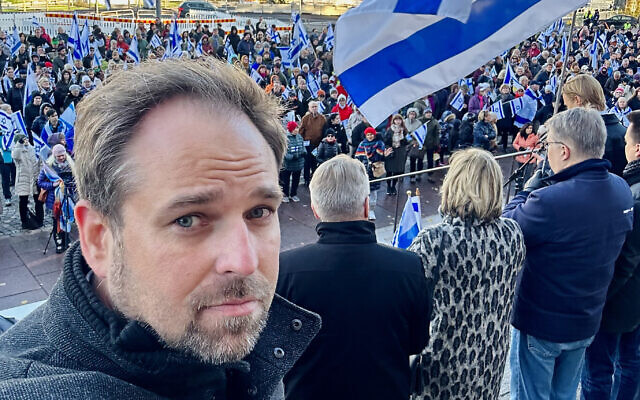
Jani Salokangas attends a pro-Israel rally in Helsinki, Finland, October 2023. (Courtesy Salokangas)
“We’re talking about an emotional attachment that means that when countless pro-Israel Christians get up in the morning, the first thing they do is go look for information about what’s going on here,” Parsons added. , born in North Carolina. but has lived in Israel for about 30 years with his Dutch-born wife. The couple have a 24-year-old son, born in Israel.
Changing attitudes among former loyal supporters
Tension over anti-Christian harassment has coincided with broader changes reshaping attitudes toward Israel within evangelical circles, according to a new book on the issue by two researchers, Motti Inbari and Kirill Bumin. In the book, “Christian Zionism in the 21st Century: American Evangelical Opinions on Israel,” they show, in a series of polls, how support for Israel has declined among evangelicals as support for the Palestinians increases.
A 2018 poll of evangelicals under 30 showed support for Israel at 68.9% and the Palestinians at 5%. But in a 2021 follow-up, support for Israel fell to just 33.6% while support for the Palestinians climbed to 24.3%. Inbari said the numbers could reflect “a youthful rebellion” by evangelicals “defying their parents’ policies.” Social media, he added, could also play a role.
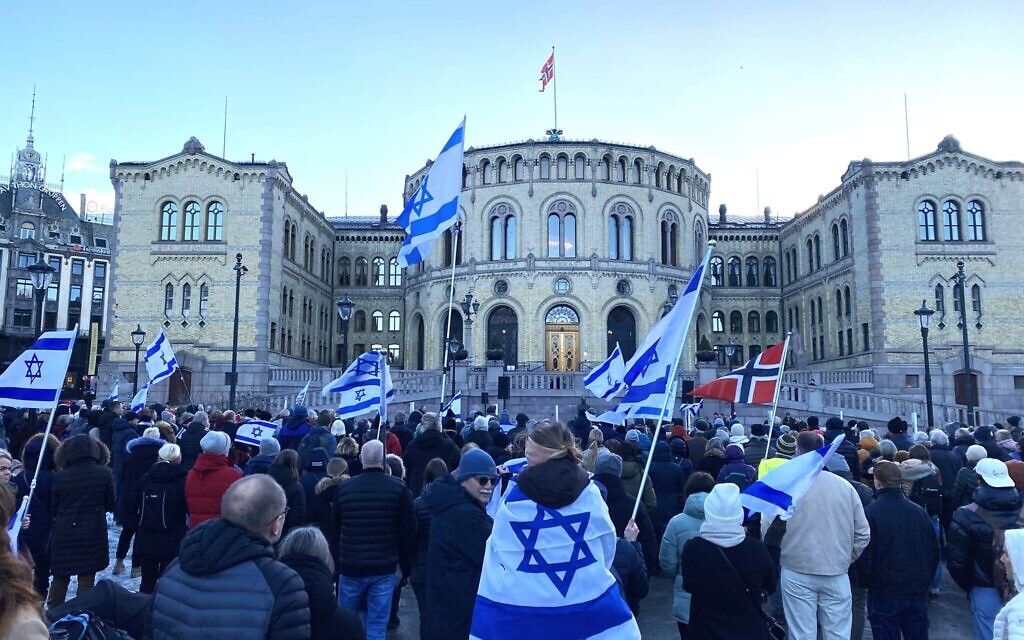
Hundreds of Christians demonstrate solidarity with Israel in Oslo, Norway, February 3, 2024. (ICEJ Norway)
However, support for Israel brings together several million evangelical Christians around the world and thousands of them live in societies where Israel is not very popular, like Norway.
Dag Juliussen, head of operations at the International Christian Embassy in Jerusalem, Norway, says the war is galvanizing support for Israel in Norway, where hundreds of people recently attended a solidarity vigil that the country’s Catholic bishops officially declared. supported for the first time in history.
Aged 51, father of three children and living near Oslo, he also left Israel after October 7 with a delegation he led here. Like Salokangas, Juliussen returned this month with Norway’s first large Christian delegation since the war.
“We are here to comfort the Jewish people, which is our mission statement, but we are also here to bear witness to what has been done to Israel and its people,” Juliussen said.
Christians for Israel, a Netherlands-based group, organized one of the first delegations to Israel after October 7 and brought dozens of activists to the south even as Hamas fired hundreds of rockets into that country every day. One of the delegation’s activities was planting tulips, the national flower of the Netherlands, in Sderot.
During the war, Christians for Israel held numerous rallies in the Netherlands, where Israel is on trial before the International Court of Justice for genocide, an allegation that Israel and its allies categorically reject.
A long-term relationship
Many visiting Christian delegations have long-standing relationships with communities near Gaza, to which Christian organizations have donated for years because Hamas has targeted those communities with rocket attacks since 2001.
On October 5, the International Christian Embassy in Jerusalem brought together 600 Christians Ofir Libsteinmayor of Sha’ar HaNegev regional council, near Sderot. On October 7, Libstein was assassinated by terrorists.
“These are people we have known for years, these are places we know, this is not an abstract conflict for us,” Paul said. Webber, a 60-year-old father of five who lives in Arizona. Last month, Webber led a delegation of members of Passages, a pro-Israel group that brought more than 11,000 young Christians to visit Israel.
Of the survivors that the Passages delegation met last month, he added: “seemed scarred, changed for life (…) you could say that they see again and again the horror they witnessed,” he said. “There are no words for it. There are no words to describe the horror, the evil that happened there.
Passages donated $500,000 to provide psychological support to survivors of Kfar Aza and Netiv Ha’asara, two of the communities hardest hit on October 7, with which Passages has a long-standing relationship.
An additional $20 million for Israel’s southerners came from the International Association of Christians and Jews led by Yael Eckstein, daughter of IFJC founder Yechiel Eckstein. This large charitable organization depends on donations from Christians to help thousands of Israelis and other Jews each year.
There are no words for the horror, the evil that happened there
The International Christian Embassy in Jerusalem raised millions more, some of which went toward improving shelters and other war preparation activities.
“I hope that as Jews see Christians take a more visually present stance, the relationship will change for the better. I hope this brings us closer together as a family,” Webber said.
The Norwegian Juliussen, however, doubts that Christian solidarity can change the minds of Jewish extremists.
“Anyone who thinks that Christians are truly out to proselytize will probably view these acts as a missionary strategy, unfortunately,” he said. The way forward, he said, passes “through the love that we, Christians, must maintain despite the challenges”.
The war with Hamas has put tensions involving Jewish radicals into perspective, according to Archbishop Paul Lanier, president of the board of directors of the International Association of Christians and Jews.
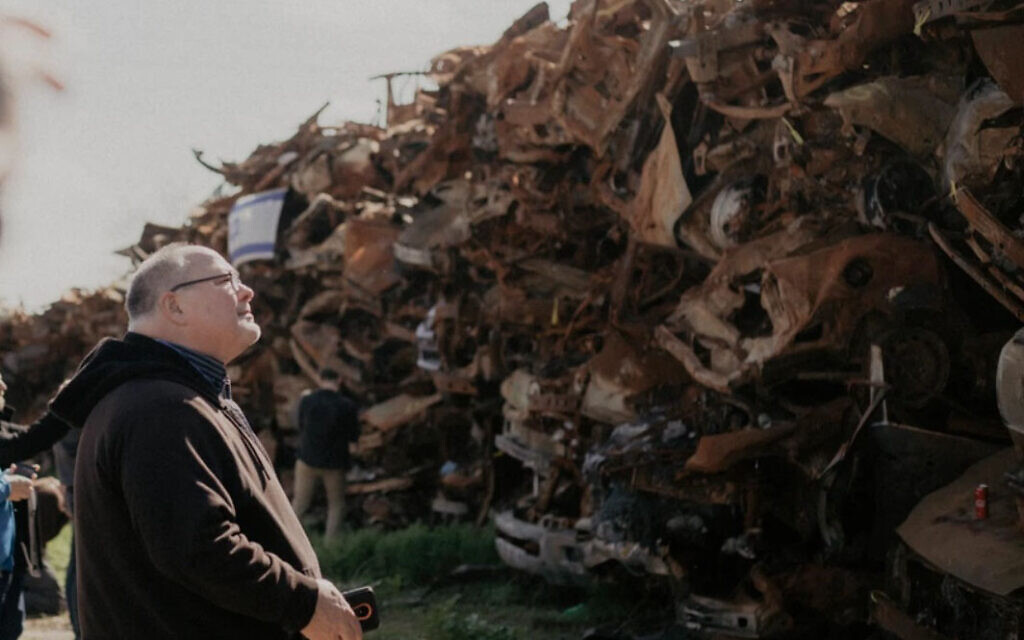
A Christian visitor to Israel examines the remains of cars recovered from the killing scene of the October 7 Hamas attack in Re’im, January 29, 2024. (ICEJ)
The May 28 prayer event at the Western Wall shocked and disturbed Lanier, as did previous incidents of harassment, the Winston-Salem, North Carolina, church leader said. “It was grotesque to see people spitting on Christians who were walking in the street quietly observing their faith,” he recalls.
On October 3, Prime Minister Benjamin Netanyahu publicly condemned anti-Christian harassment and “addressed this issue,” said Lanier, 63, a father of two.
“In peacetime, we have the luxury of nitpicking and being territorial,” Lanier said. “I think there’s no doubt that the massacre has totally eclipsed the problem, which I think is now behind us.”


